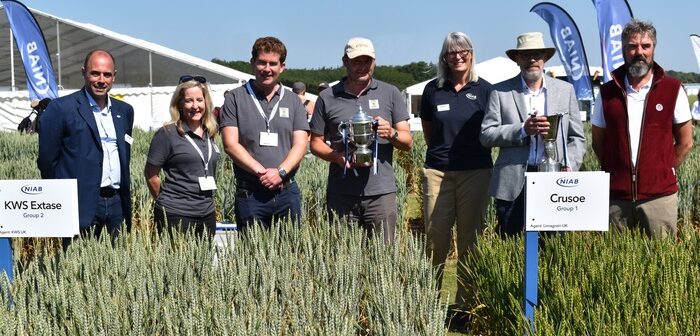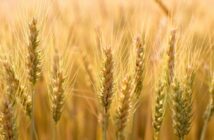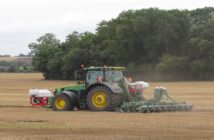NIAB chief executive Professor Mario Caccamo presented the prestigious industry awards to KWS’s William Compson, Kirsty Richards and Mark Dodds and Limagrain’s Ron Granger and Ian Foot at the 2023 Cereals Event.
Professor Caccamo congratulated both KWS and Limagrain teams. “It takes a truly exceptional variety to win the NIAB Cups in a normal year and we can go for several years without making an award; other than our Centenary Award in 2019 it has been eight years since both Cups were last awarded. And it’s been 30 years since both Cups were awarded to a cereal variety in the same year, with the winter barley Puffin winning the Cereals Cup and the winter wheat Hereward winning the Variety Cup in 1993.
“Varieties of all types of crops are reviewed on an annual basis by NIAB’s crop specialists and agronomists as candidates and there were a number of strong contenders this year for both Cups. The winning varieties KWS Extase and Crusoe are outstanding examples of the strength and diversity of the UK’s plant breeding programmes,” said Professor Caccamo.
NIAB Cereals Cup
The Cereals Cup is awarded to varieties that show outstanding merit and value in their marketplace, and can be awarded to relative newcomers to the market, particularly if they represent a step forward for the crop. It was first awarded in 1953 to the spring barley Proctor and past winners have included Einstein winter wheat in 2005, Pearl winter barley in 2004, Claire winter wheat in 2001 and Skyfall winter wheat in 2015.
NIAB cereal crop technical specialist Clare Leaman explained that KWS Extase was a strong contender for the Cup alongst a number of candidates this year, ultimately winning because it represented a significant advance in winter wheat disease resistance without detriment to yield and quality. Added to the AHDB Recommended List (RL) in 2019 it has also achieved over 14% market share in the past two years, reinforcing its first place for the Cup.“KWS Extase was the first variety that combined competitive yield and robust Septoria resistance; the fact that it is a Group 2 bread-maker makes this all the more remarkable. Its resistance led many growers and advisors to really challenge the accepted wisdom, and spend, of their existing fungicide programmes.”
It is a great honour for KWS Extase to win the NIAB Cereals Cup, said KWS UK country manager Will Compson. “The variety was a significant step forward with regard to the challenges growers were facing and the need for more sustainable farming practices. With high outright yields, it was the first variety to achieve over 8 for Septoria linked to untreated yields of 95% of controls and good Group 2 grain quality.
“It also arrived at a time when growers were having to rethink their production systems as the number of agrochemicals diminished and environmental demands increased. The backbone of Septoria control, chlorothalonil, was lost in May 2020, for example, and this forced people to view varietal disease resistance differently. Many realised they could rely on this resistance as a tank mix partner to boost control and modify their agronomic inputs accordingly.”
KWS Extase also broke the link between good disease package and poor grain quality with a high grain specification readily accepted across UK mills and premium milling contracts readily available, Will Compson said. “Today, KWS Extase remains more relevant than ever. It still has the highest untreated yield on the RL at 97%, and will account for one in seven fields harvested this summer.”
NIAB Variety Cup
The Variety Cup acknowledges varieties that have made a major contribution to crop productivity through improved quality, disease resistance, grower return or commercial success, and can be drawn from the entire spectrum of horticultural, ornamental and agricultural crops. It was first awarded in 1986 to the cauliflower White Rock, with past winners including Libravo winter oilseed rape in 1990, perennial ryegrasses Aberdart in 2003 and Abergreen in 2015 and Roberta sugar beet in 2004.
Mrs Leaman explains that Crusoe was an obvious candidate and worthwhile winner for the Variety Cup. “This milling wheat has been on the Recommended List since 2012 and remains popular with growers and end-users alike. Crusoe is the most likely to achieve a full milling specification and has the most efficient protein production. Whilst it reached its peak acreage in 2016 its market share in the south of England has actually increased in 2023, in part due to its robust yellow rust resistance that has stood the test of time. Many congratulations to both our winners,” said Mrs Leaman.
“We are delighted to accept the NIAB Variety Cup for Crusoe,” Limagrain UK’s wheat quality manager, Ian Foot, said. “It’s a huge honour for those behind the variety, at Limagrain UK and the original Nickerson team. Crusoe’s quality stood out as something special from our very first laboratory assessments. It has proven ability to achieve a stable Hagberg, good specific weight, and inherently high protein; all are a real bonus for growers and end users. The excellent consistency desired by millers and bakers became evident after many years of commercial success, and Crusoe continues to deliver good baking quality with exceptionally white flour.”
Arable technical manager, Ron Granger, said many see Crusoe as the “gold standard” for bread-making, showing true robustness for more than a decade, when other varieties have come and gone. “Agronomically, Crusoe has all the characteristics quality wheat growers desire; good on-farm performance, short, stiff straw, proven yellow rust and Septoria resistance, and a secure grain sample. Crusoe’s tight glume characteristic protects grain, minimising quality deterioration and sprouting, resulting in it hitting contract specification more than any other Group 1, especially in a wet harvest.
“For breeders, Group 1 wheats are tough to crack, but a good variety with proven performance, usually rewards by staying in the marketplace longer than any other segment. Crusoe deserves this recognition,” finished Mr Granger.




